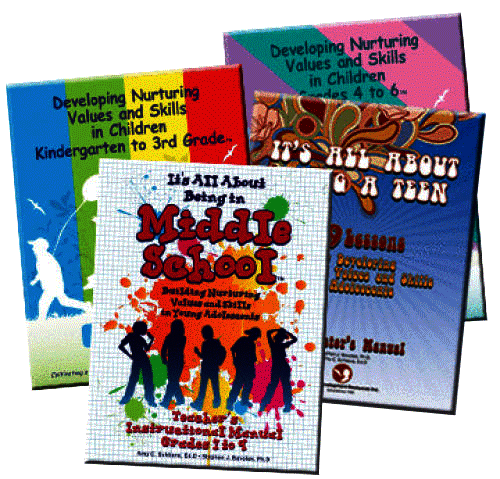

The overall goal of the Developing Nurturing Skills Program is to cultivate a culture that promotes positive nurturing beliefs, knowledge and behaviors in our classrooms and in our families. Working together to create a “norm of nurturing” teachers and parents can make both the classroom and the home two environments that reinforce positive nurturing.
Cultivating a Culture of Nurturing in our Schools and Families
The ability to positively nurture is a part of the nature of all human beings. We are born with the predisposition to care for others by forming strong bonds and positive, secure attachments. Unfortunately for many children, abusive and neglecting experiences, both in our homes and in our classrooms have been the norm.
The result has been generation after generation of children and adults being redirected away from their compassionate nature to their learned patterns of dysfunctional behavior. However, learned dysfunctional behaviors can be unlearned and replaced with new, healthy nurturing behaviors with a strong, consistent and comprehensive community-based program.
Program Goals
Goal #1: The overall goal of the DNS program is to cultivate a culture that promotes positive nurturing beliefs, knowledge and behaviors in our classrooms and in our families. Working together to create a “norm of nurturing” teachers and parents can make both the classroom and the home two environments that reinforce positive nurturing.
Goal #2: To enhance self-awareness, self-worth, emotional regulation, empathy, empowerment and protective skills in children and teens through daily classroom instruction.
Goal #3: To improve the nurturing parenting interactions between parents and children.
Description and Components of the DNS Program
1. Classroom Lessons. Children and teens receive nurturing lessons during regular school time. The lessons are taught by trained teachers during “Circle Time” in the younger K-3 and 4-6 grades. Middle Schools and High Schools offer the lessons at a time designated by the individual schools. Nurturing lessons incorporate five critical skill areas that have proven effectiveness in building healthy, nurturing skills: Empathy; Positive Self-Worth; Personal Empowerment, Making Good Choices and Being Safe, and Emotional-Self Regulation.
The DNS school-based programs are presented in four separate Teacher’s Instructional Manuals.
• DNS - K to 3: Lessons for children kindergarten to 3rd grade.
• DNS - 4 to 6: curriculum designed for children grades 4 to 6.
• DNS - 7 to 9: “It’s All About Being in Middle School” lessons for Middle School students.
• DNS - 10 to 12: “It’s All About Being a Teen” lessons for High School students.
2. Teacher Nurturing Training (TNT). The TNT training offered to educators has been described as “a dynamite way for educators to teach and a powerful way for students to learn.” This comprehensive workshop is designed for educators to incorporate nurturing skills into their teaching style. The key qualities in Teacher Nurturing is an empathic approach in implementing classroom discipline designed to enhance positive self-worth, caring and compassion, and a positive sense of empowerment. The skills in the TNT compliment the nurturing lessons taught to children and their parents.
3. The ABC’s of Nurturing: Teaching Nurturing Skills to Parents and their Children. The ABC’s of Nurturing is a seven session parenting program offered in cooperation with the schools. The purpose of the family based program is to reinforce the concepts and skills the children are learning in the classroom. This comprehensive approach allows teachers and parents to work in a cooperative and consistent manner promoting the positive nurturing characteristics and qualities of their children.
The DNS Programs were first developed in 1993 from 10 years of proven effectiveness with the Children's Nurturing Programs which are a part of the family-based Parenting-Child Nurturing Programs.
In 2002, a study specifically designed to assess the effects of the Developing Nurturing Skills lessons on the social, emotional, and academic behaviors was conducted in kindergarten classrooms in upstate New York. Eight kindergarten teachers implemented the DNS throughout the school year (treatment group).
Compared to a cohort of kindergarten classes not taught the Nurturing Skills lessons, the results of the study showed children in the treatment classes had a significant decrease in antisocial behaviors including aggression, dominance, disruptive behavior, and socially immature behavior. Prosocial behavior increased significantly over time. Data support the positive impact the DNS had in positively influencing the social, emotional, and academic behaviors in the treatment group.

